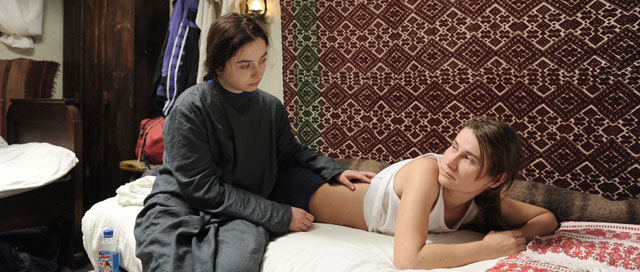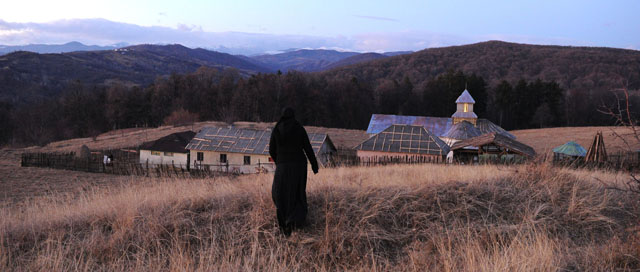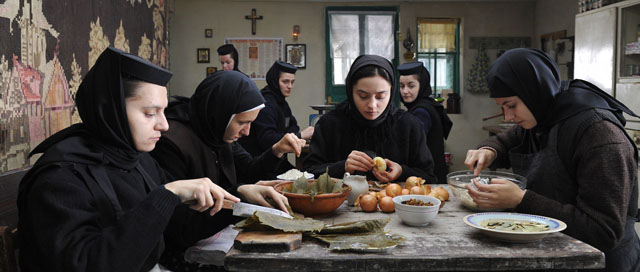“A cerebral melodrama of the most steely, bare and brutal kind, Beyond the Hills is the third feature from Romanian director Cristian Mungiu and his first since winning the Palme d’Or at Cannes in 2007 for 4 Months, 3 Weeks & 2 Days,” begins Time Out London‘s Dave Calhoun. “Alina (Cristina Flutur) and Voichita (Cosmina Stratan) are two young women in their mid-twenties. Old friends who grew up together in an orphanage, they reunite over a weekend. Alina has come back to Romania from Germany and wants Voichita to return with her. But Voichita is reluctant to leave the monastery where she lives with a dozen other women and a lone priest (Valeriu Andriuta), believing she’s found a cure for crippling loneliness, God. Mungiu embeds us in the world of her frugal, barren monastery over a few days, with Alina’s presence forcing her to confront her beliefs. Meanwhile, her colleagues react with increasing hostility to the threat Alina poses to their way of life.”
Mike D’Angelo at the AV Club: “What follows is at times almost unbearably intense—where 4/3/2 maintained a gradually escalating level of coiled tension, Beyond the Hills flat-out explodes again and again, like the chorus of a Pixies or Nirvana song. At two-and-a-half hours, it’s the longest film in Competition this year, but it feels like one of the shortest. Thing is, though, while I worked hard to perceive ambiguity in Alina’s situation (which is loosely based on a real-life event), Mungiu winds up making what seems to me a fairly emphatic judgment…. Mungiu has few peers when it comes to formally rigorous nail-biters, but I’d like to see him tackle material he’s more conflicted about.”
For the LA Weekly‘s Karina Longworth, Beyond the Hills is “something of a disappointment. The initially fascinating, ambiguous relationship between the two young women—were they lovers? Were they ever as close as the unstable Alina remembers or imagines?—is overwhelmed by the hysteria spawned by her unflaggingly intense presence at the monastery…. Given Mungui’s past work and documented interests, there’s surely a larger allegory about his country at work here, but on first viewing I couldn’t quite piece it together…. Even if there isn’t one, you’re left with Flutur and Stratan’s performances—both haunting and heartbreaking.”
At the House Next Door, Budd Wilkins grants that “there are fascinating glimpses into the Soviet-style bureaucratization of the Orthodox religion (including the film’s best scene, wherein the other girls indoctrinate Alina into the 436 sins recognized by their dogma) and the collapse of any distinction between science and religion (the doctor who washes his hands of Alina’s malady, sending her back to the tender mercies of monastery life). In no way, however, can these miniscule morsels of insight begin to compensate for Mungiu’s otherwise empty plate.”
“Mungiu maintains an admirably non-judgmental distance from his characters throughout,” writes Stephen Dalton in the Hollywood Reporter. “The needy, demanding, unsympathetic Alina is never an obvious victim. The priest and nuns are morally flawed but essentially well-meaning. Even the climatic exorcism occurs off screen, a smart choice given the weight of cinematic cliché such events have accumulated over the decades. Filmed on location at a specially constructed church compound in the hills some 100 km from the Romanian capital of Bucharest, Mungiu’s harshly beautiful depiction of destructive dogma and sacrificial female victims feels at times like vintage Lars Von Trier. It is certainly shot with Dogme 95-style naturalism, stripped of such vain frippery as non-diegetic sound or special effects. Shot on high-contrast digital video, many of then film’s color-drained tableaux have all the Calvinist purity of an old Dutch Master painting.”
Beyond the Hills “builds its moral crisis with an unwavering commitment to realism and methodical attention to detail,” writes Justin Chang in Variety. “The widescreen compositions, all blues, grays, browns and blacks, convey a physical sense of the cramped, chilly quarters in which these women lead their ascetic lives, and the power dynamics are continually reinforced by the helmer’s impeccable blocking. At times, the nuns’ vampirical black robes (in contrast with their deathly pale faces) are swallowed whole by background shadows, conjuring the charged, disquieting atmosphere of a horror picture.
IndieWIRE‘s Eric Kohn finds that, “while sharply written to accentuate its core relationship, Beyond the Hills stumbles into a cycle of redundancy over its prolonged running time. There’s a full hour of exposition before Alina truly begins to challenge the church, and then the story essentially repeats itself several times before its disquieting climax. Mungiu’s method creates the feeling of being submerged in a maze of confrontations and chatter, but the build-up gets so tiring that the concluding scenes come as a relief instead of a payoff. From a technical standpoint, this may as well be Mungiu’s version of The Tree of Life, a movie that has undergone so many versions that the final one may not even exist. Hack away at Beyond the Hills and there’s a far more satisfying movie.”
“The whole film has been conceived as a highly deliberate ritual, its deep-dish themes just about scrawled in blood on the characters’ foreheads,” writes Entertainment Weekly‘s Owen Gleiberman. “There’s a grandiosity to it, but not much mystery.”
More from Geoff Andrew (Sight & Sound), Dan Fainaru (Screen), Kevin Jagernauth (Playlist, B+) and Domenico La Porta, who also interviews Mungiu for Cineuropa. Scott Roxborough talks with him as well for the Hollywood Reporter. And you can listen to the press conference here.
Updates: “Mungiu apparently based the action on the reportage of the BBC World Service’s Bucharest bureau chief Tatiana Niculescu Bran who wrote about a case in 2005, where a novice died after being subjected to an exorcism in Romania’s Tanacu monastery: an irrational horror at the heart of 21st-century Europe.” The Guardian‘s Peter Bradshaw: “Fictionalizing this real case, Mungiu brings his distinctive dramatic language, his flair for creating group-tableaux photographed from a single, static camera position, his skill in portraying intimate, embattled female relationships, and his shrewd connoisseurship of officialdom’s bland, harassed pomposities. In the final act, as the screw of fear is turned, the film seems to bear a weird resemblance to Lars Von Trier.”
More from David Fear (Time Out New York) and Drew McWeeny (HitFix).
Update, 5/21: “At his party,” reports Manohla Dargis in the New York Times, “a typical Cannes beach affair with pounding beats and revelers swarming the open bar, Mr. Mungiu talked about his film, the difficulties of shooting in winter and working with a young, untested cast…. ‘The film should be watched and judged from each character’s perspective,’ he explained, giving the larger, suggestively political view. ‘This is how you will discover that it is difficult to say who is guilty, because the people who are really guilty are not in the film. They are the people who created this kind of society, the people who created education that completely lacks the very important moral values that people should have.'”
Updates, 5/24: “Mungiu’s latest confirms all of the promise of his earlier films and then some,” argues Scott Foundas at the Film Society of Lincoln Center. “And yet, and yet, and yet, I must confess to feeling some small tinge of reservation about Mungiu’s film that I haven’t quite yet put my finger on, except to say that, whereas 4 Months, 3 Weeks and 2 Days left me feeling certain that every one of its directorial choices was entirely dictated by the needs of the story, in Beyond the Hills I sensed an occasional self-consciousness behind the staging and timing of certain scenes (particularly the final one), and a more general sense that Mungiu—who has admitted in interviews to a rushed post-production schedule—hadn’t quite hit upon the perfect rhythm for the film.”
“Without giving too much of the plot away,” writes David Jenkins at Little White Lies, “the later machinations closely mirror those in both Powell and Pressburger’s Black Narcissus and Lars von Trier’s Dogville, with frenzied power struggles layering up by the scene as it soon becomes clear that Alina is not giving up her woman. Like 4 Months…, Beyond the Hills also eludes easy genre categorisation, flitting between social realist slice-of-life drama, heartbreaking gay romance, possession horror and, in its sublime—and extremely Romanian—final shot, sardonic police procedural.”
Update, 5/27: Mungiu has won the Prix du Scenario (Best Screenplay) and Flutur and Stratan have, together, won the Prix d’interpretation feminine (Best Actress).
Update, 5/29: The Film Society of Lincoln Center’s target=”_blank”>Scott Foundas has a wide-ranging conversation with Mungiu.
Cannes 2012 Index: a guide to the coverage of the coverage. For news and tips throughout the day every day, follow @KeyframeDaily on Twitter and/or the RSS feed. Get Keyframe Daily in your inbox by signing in at fandor.com/daily.






